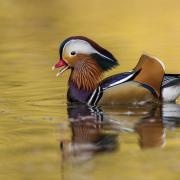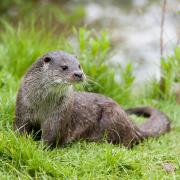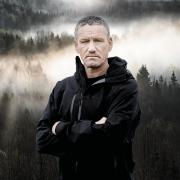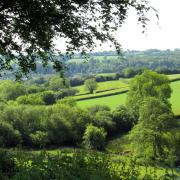The King of Fish, the Atlantic salmon, is at the centre of a remarkable event this month which brings together athletes, scientists, artists, anglers and a host of local communities across a 50 mile stretch of the county.
The first Salmon Run took place in 2022, a relay of runners, passing between them a salmon icon, carrying it along the River Exe from the sea to the fish’s spawning grounds on Exmoor. The journey of the icon and the runners was a way of drawing attention to the epic migration taken by the salmon.
Salmon Run, which is now back for its third year, is organised by Tidelines, a community-led organisation, run by husband and wife artists Anne-Marie Culhane and Jo Salter; also involved are Wild Running, Friends of the River Exe and Westcountry Rivers Trust.
What marks the event out is the detailed research, creativity and unusual collaboration of such diverse groups.

Two years ago Anne-Marie and Jo were working with RAMM in Exeter, along with the university and city council on ways the museum’s collections could help shape a sustainable and environmental future for Exeter.
Focus turned to the River Exe which flows through the city and the artists’ imaginations were sparked by the mammoth salmon, caught in the river in 1924 and weighing 27.8kg, which is now on display in Topsham Museum.
They thought of these fish coming from Greenland and Iceland, passing through the heart of the city then onwards in their difficult upstream journey, and they began to see the river as a transitory space, a habitat, and a source of health, food and life.
In the past thousands of salmon would ‘run’ in the River Exe, but since 1970 Europe’s salmon have declined by 93 per cent and the British population of Atlantic salmon is now officially classified as ‘Endangered’ on the IUCN Red List of Threatened Species.
What's more, the Atlantic salmon is seen as an indicator species for river health, as it requires good clean, well-oxygenated water.

‘It’s like the canary in the coalmine,’ says Adrian Dowding, Devon river and fisheries manager for Westcountry Rivers Trust. ‘Save the salmon, and you’ll save many other freshwater species too, to provide the good quality, clean and healthy freshwater on which we all rely.’
Salmon Run focuses on these incredible fish and also on alerting people to the plight of the Exe and rivers in general, and it supports the work that’s going on to help them, including the Strategic Exe Weirs project, being run by Westcountry Rivers Trust. This is looking at the weirs on the Exe and its tributaries which hamper the salmon’s upstream swim, and finding ways to adjust or remove them to help not only salmon but other migratory fish.
Salmon Run consists of a 5K run based in Exeter, then the relay for teams which covers the 50 mile course from Exmouth to Tarr Steps on Exmoor, and there is also an Ultra run for elite runners.
Whatever your ability, all the runs in a way symbolise the effort required by the salmon on its journey, says Anne-Marie.

‘Travelling up river you also get a real feel for the change of scale and environment that the salmon navigates in her lifetime from wide, deep ocean currents and tides to floods or shallow tree lined, gravel bedded streams and waterfalls.’
There is a growing global movement linking sport and the environment, with athletes using the power of sport to campaign for environmental issues. One of the runners in Salmon Run and a supporter of the event is Etienne Stott, a gold medal winning Olympic canoeist who is now a climate activist and co-founder of Champions for Earth.
‘This is a really cool idea and a great way to combine sport and art with nature protection,’ he says.
As the route snakes through the Devon countryside, communities along the river are encouraged to become involved, some providing cakes and refreshments, says race organiser Ceri Rees.

Ceri is the founder of Wild Running, another community organisation which sets up trail running adventures and courses and supports environmentally conscious running.
He admires the way Salmon Run has different strands. ‘It's quite visual and is bringing in a creative element that can be missing from other sporting events.’
He says: ‘By bringing people into deeper connection to the places they are running through together, and in empathy with other beings, we can understand, protect and act with greater awareness of the natural world and what is at stake from the climate and nature crisis.’
The main gathering point on the day is at Salmon Pool, St James’ Weir on Riverside Valley Park in the city. There are activities to take part in and it’s where the 5K run begins, a fun event with many people arriving in fancy dress.

There’s a ritual element to the day too, with a ceremony at each stage of the relay as the hand-carved wooden salmon baton is handed over.
‘The salmon is at the centre of rituals in many cultures across the world,’ says Anne-Marie. ‘There are some amazing rituals and salmon ceremonies in other cultures where they acknowledge the importance of the species and the need to manage it sustainably.’
Away from the festival atmosphere in Exeter, the ‘end’ of the relay on Exmoor has a very different atmosphere. It’s a more low key moment to the day, reflecting the wilder environment near the source of the Exe, says Anne-Marie.
‘Everyone is arriving in dribs and drabs, but we have another little ceremony. It’s beautiful, as it’s getting dark – and it’s where the salmon need these quiet waters.’

In previous years North Devon angler and writer Michelle Werrett has read a piece of poetry or an excerpt from her own book about Exmoor’s rivers, Song of the Streams.
‘Salmon numbers are just depleting so sadly and in recent years they’ve just been going down and down for whole variety of reasons,’ she says.
‘So many things are turned against them, but I think a lot of people are not even aware of this and don’t seem to even recognise that the salmon are there.
‘We walk in the countryside and we walk along the river and we think how beautiful it all is, but the surface of the water is like a veil into another world and people are not aware of all this going on underneath.
‘Fish are not as obvious as a bird would be, or a mammal, so something like this to draw people attention is hugely valuable.’

‘I hope Salmon Run will reach people and inspire them to be concerned,’ she says.
‘We need a step-change in responding to conservation and recovery of our species, and how we look after our rivers,’ says Adrian.
Salmon Run can play a vital part, he says, especially with its scope of people and organisations involved.
‘Through a collaborative partnership approach we can help address the multitude of impacts on our rivers, with different partners focusing on improvements across the board to create ‘life by a thousand plasters’,’ he says.
Salmon Run is on Sunday, September 29.
tidelines.co.uk/blog/salmon-run-2024

The weir problem
The River Exe name is thought to derive from the word ‘isca’, which translates as either ‘water’ or ‘abounding in fish’.
It is a key salmon river in the South West and also home to other species including European eel, lampreys, and trout.
It also contains many weirs, barriers to the salmon which they famously leap or vault over.
These are being reassessed in The Strategic Exe Weirs project which will improve river access for migrating fish.
‘We have identified 17 priority weirs in the main Exe (and many more in the tributaries) which slow or stop these migratory fish from undertaking their historic route from sea to source or back to sea,’ says Adrian Dowding form Westcountry Rivers Trust.
‘The salmon’s ability to vault these huge structures depends on reliable amounts of water in the rivers at the right times and in the right quantities,’ adds Anne-Marie. ‘Each weir crossing slows their journey and depletes energy as they leap over concrete or traverse fish ladders, often pausing for long periods to wait for the water levels to be right and levels are increasingly too low due to drought or too high due to increased flash rainfall.’
wrt.org.uk/project/strategic-exe-weirs




























